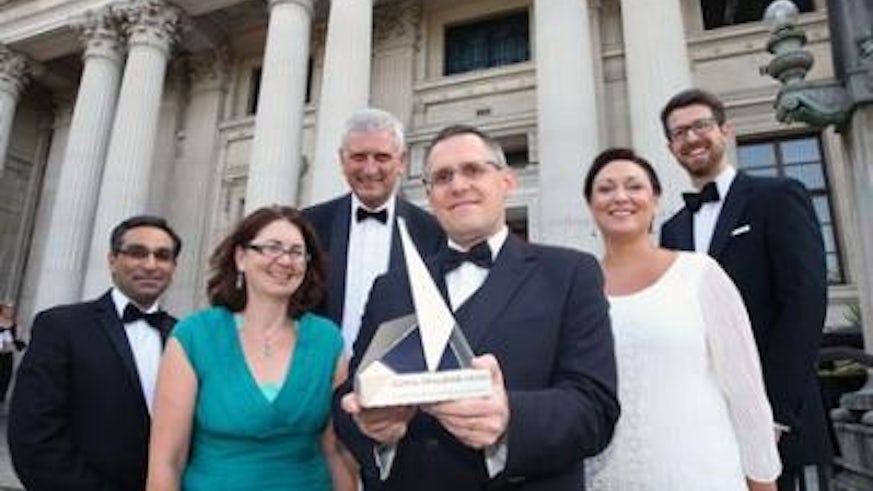Global Challenge Award
2 Mehefin 2014

Researchers at Cardiff University's Geoenvironmental Research Centre have won this year's Global Challenge Award. Professor Hywel Thomas, the Geoenvironmental Research Centre team and Dr Vladimir Michal (International Atomic Energy Agency) accepted the award from Ceri Delemore, Partner at Geldards, the event sponsors.
Scientists and engineers at Universities, Research Institutes and Waste Management Organizations have worked for several decades to progressively improve the scientific and technical basis upon which rests the safety of geological disposal. Contributions such as the one provided through the work of the GRC are fundamental to understand the underlying processes, and to model and simulate their evolution as a basis to long term safety.
Temporary storage facilities span the globe, but the need for a disposal solution has long been recognised by multinational governments and nuclear authorities, including the International Atomic Energy Authority (IAEA).
Some 250 to 300 Ktons of high level nuclear waste is stored across the world, and remains radioactive and deadly to all living organisms for over 100,000 years. Experts recognised that deep geological disposal reduces the need for constant supervision and maintenance, reduces security risks associated with ground level storage, and saves future generations from inheriting a nuclear waste legacy. However, practically, the technical complexities of achieving this have meant that up until now this has not been possible.
Researchers in the School of Engineering's Geoenvironmental Research Centre, supported by the European Commission's EURATOM programme, developed a model to understand how barriers used in nuclear waste disposal will perform. The model's findings went on to influence the design and build of a number of new nuclear waste storage facilities.
The team developed an in-house computer programme called COMPASS to simulate the behaviour of a nuclear waste repository over many years, providing a better understanding of how the nuclear repository barriers perform - a process which was not sufficiently understood prior to the research.
The computerised model provides innovative predictions of the behaviour and long term durability of engineered clay barriers (consisting of bentonite) under specific repository conditions.
The software has been accessed and applied by International Nuclear Waste Disposal Authorities. GRC's work with SKB, the Swedish Nuclear Fuel and Waste Management Company, has led to the design and construction of a new repository at Forsmark, which is expected to be filled by 2025. The research also contributed to the development of a nuclear repository, Onkalo, in Finland, where final nuclear waste disposal is scheduled to start in 2020.
GRC was designated an IAEA "Centre of Excellence" for its work on high level nuclear waste disposal in 2001 and was a founder member of the Agency's Underground Research Network (URF). GRC received a Queen's Anniversary Prize for Higher and Further Education in 2013.
Professor Hywel Thomas, Director of the GRC, said: "We are delighted to have won the Global Challenge award. Our research prompted a major rethink in the design and construction of nuclear waste repositories. It also led to capacity building in countries with civil nuclear programmes, and brought economic benefits through the efficient disposal of nuclear waste, and through the transfer of knowledge and best practice. The findings increased international governments' confidence in the ability to accurately model and forecast the behaviour of engineered clay barriers. Subsequently, several countries have issued licences and begun building nuclear waste repositories."
Stefan Mayer, Leader of the Disposal Team in the Department of Nuclear Energy, International Atomic Energy Agency, noted: "The Underground Research Facilities Network has provided a very positive contribution. The GRC is one of the founding partners of the Network and Professor Hywel Thomas, as the Chair of the Network, has substantially contributed to sharing state-of-the-art information, to training young professionals and to promoting the safe development of disposal worldwide."
